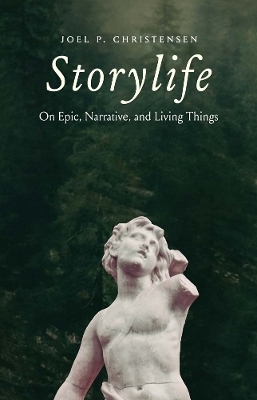
Storylife
On Epic, Narrative, and Living Things
Seiten
2025
Yale University Press (Verlag)
978-0-300-26923-9 (ISBN)
Yale University Press (Verlag)
978-0-300-26923-9 (ISBN)
- Noch nicht erschienen (ca. Februar 2025)
- Portofrei ab CHF 40
- Auch auf Rechnung
- Artikel merken
From Homer’s epics to mainstream news, stories have lives of their own—and humans may not always control the narratives we create
Combining ancient epic and myth with analogies from biology and the natural world, Joel P. Christensen explores the creative process and how narratives develop. This bold work urges readers to treat narratives as living things with their own agency in the world. Christensen starts by using Homeric epic to explore the way language and meaning develop alongside audiences in complex ecosystems and then moves through storytelling in the ancient Mediterranean over a thousand years. In this study, which ranges from the evolution of narratives to viral ideas, and to the dangerous side of stories in mass shootings and war, we see how narratives function as independent entities with consequences that cause lasting harm.
Connecting his argument to the present day, Christensen addresses contemporary cultural panics, including AI and ChatGPT, “post-truth” or alt-facts in the digital age, and free speech and cancel culture. Storylife invites readers to rethink human creativity, the importance of collective actions, and the lives we build together with and against narrative. In an age rife with misinformation, it is time to reconsider how much control we have over stories and how to educate ourselves once we acknowledge the power that narrative exerts over us.
Combining ancient epic and myth with analogies from biology and the natural world, Joel P. Christensen explores the creative process and how narratives develop. This bold work urges readers to treat narratives as living things with their own agency in the world. Christensen starts by using Homeric epic to explore the way language and meaning develop alongside audiences in complex ecosystems and then moves through storytelling in the ancient Mediterranean over a thousand years. In this study, which ranges from the evolution of narratives to viral ideas, and to the dangerous side of stories in mass shootings and war, we see how narratives function as independent entities with consequences that cause lasting harm.
Connecting his argument to the present day, Christensen addresses contemporary cultural panics, including AI and ChatGPT, “post-truth” or alt-facts in the digital age, and free speech and cancel culture. Storylife invites readers to rethink human creativity, the importance of collective actions, and the lives we build together with and against narrative. In an age rife with misinformation, it is time to reconsider how much control we have over stories and how to educate ourselves once we acknowledge the power that narrative exerts over us.
Joel P. Christensen is professor of Classical and Early Mediterranean Studies at Brandeis University. He is the author of The Many-Minded Man: The “Odyssey,” Psychology, and the Therapy of Epic and coauthor of Homer: A Beginner’s Guide. He lives in Medford, MA.
| Erscheinungsdatum | 26.08.2024 |
|---|---|
| Zusatzinfo | 2 b-w illus. |
| Sprache | englisch |
| Maße | 140 x 216 mm |
| Themenwelt | Geisteswissenschaften ► Psychologie ► Allgemeine Psychologie |
| Geisteswissenschaften ► Psychologie ► Verhaltenstherapie | |
| Geisteswissenschaften ► Sprach- / Literaturwissenschaft ► Anglistik / Amerikanistik | |
| Geisteswissenschaften ► Sprach- / Literaturwissenschaft ► Literaturwissenschaft | |
| Sozialwissenschaften ► Pädagogik | |
| Sozialwissenschaften ► Soziologie | |
| ISBN-10 | 0-300-26923-4 / 0300269234 |
| ISBN-13 | 978-0-300-26923-9 / 9780300269239 |
| Zustand | Neuware |
| Haben Sie eine Frage zum Produkt? |
Mehr entdecken
aus dem Bereich
aus dem Bereich
Buch | Softcover (2024)
Hogrefe Verlag
CHF 46,50


